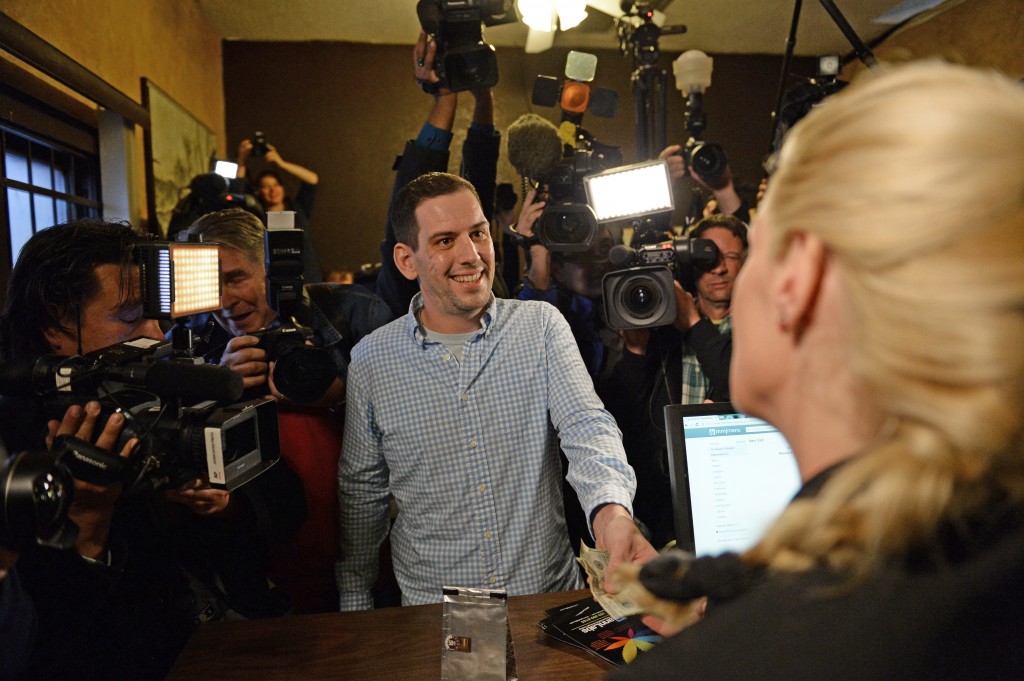One year after he became, unofficially, the first legal recreational marijuana customer in America, Sean Azzariti sits on a couch in Denver’s 3D Cannabis Center and looks up to see … himself.
The 4-foot-wide photo hanging over the couch shows Azzariti, an Iraq war veteran chosen for the ceremonial first purchase for his advocacy on post-traumatic stress disorder, cocooned by cameras on Jan. 1. The subsequent year — media requests, speaking gigs, advocacy awards, cannabis celebrity — washed by in what Azzariti calls “waves of awesomeness.”

“So, I have to ask,” a somewhat star-struck young guy says to Azzariti, nodding toward the picture. “Did you really say, ‘One marijuana, please?’ when you were at the counter?”
Azzariti laughs no. It’s just an urban myth that arose from an artist’s rendering of the first purchase.
“But feel free,” he jokes, “to tell people that I did.”
Only one year in, Colorado’s unprecedented jump into marijuana legalization has become the stuff of legend.
For opponents and supporters, the state comes up repeatedly in the evolving discussion about marijuana. It is perhaps the most underappreciated consequence of legalization. By becoming the first place in the world to actually legalize commercial sales of marijuana to anyone over 21, Colorado made the worldwide debate over pot more vibrant than it has ever been.
Coming Sunday: Pick up a Denver Post on Dec. 28 for our 24-page special report A Year Of Legal Pot, dissecting Colorado’s first year of legal recreational marijuana sales.
Year in review:
Special report from The Cannabist
A new quest: U.S. patent protection for cannabis seeds
Those in favor of legalization now think of Colorado — and, to a lesser extent, Washington state, which debuted a smaller marijuana market later in the year — as a kind of political homeland. The states’ campaigns and resulting industries were the inspiration for pro-pot successes in two more states this fall and are the blueprints for coming 2016 campaigns in as many as a half-dozen states. They helped foment never-before-seen congressional rebellion against federal enforcement of marijuana laws.
“It would not have become a topic of national debate so immediately if Colorado’s laws hadn’t come online early in the year,” said Aaron Houston, a D.C. lobbyist for the company WeedMaps who has worked on pro-marijuana issues since 2003. “Colorado’s law was a game-changer because it shifted the debate at the federal level from if to when.”

Those opposed to legalization, though, see Colorado as a cautionary tale — hard evidence of the kinds of dangers that they previously had been able to warn of only in the abstract. In speeches in states and countries considering legalization, marijuana opponents now talk about accidental pot ingestions, lower-than-predicted tax revenue, gaudy industry advertising and even deaths. They cite examples of each from Colorado’s first year of legalized sales.
“We’re able to say, ‘Here is what legalization looks like in practice, not just in theory,’ ” said Kevin Sabet, one of the nation’s most prominent legalization foes as a co-founder of the group Smart Approaches to Marijuana. “That’s actually very valuable.”
The on-the-ground reality, of course, has been less stark than either side’s version. Marijuana legalization has changed Colorado. It’s just tough to say exactly how.
Marijuana is more available in Colorado than ever before, but it’s unclear whether marijuana consumption has risen as a result. Teens are less likely to think that marijuana is harmful, and marijuana arrests at Denver schools are up, but that hasn’t yet translated into measurably increased use. More people may be driving stoned, but traffic fatalities are down.
The smell of pot is more common along Denver’s 16th Street Mall.
Opinion: Talking ’bout our rights and the sweet smell of freedom
Tourism to the state hit record levels this year. But how much of that has to do with marijuana?
After a full year, legal marijuana sales are an experiment still very much in progress.
“People are trying to jump to conclusions much faster than the data allows,” said Andrew Freedman, the man in charge of coordinating Colorado’s policy efforts on marijuana legalization.
The jumps are even bigger because of Colorado’s data-collection woes. The state lacks systems for quick, accurate measurements of youth use, marijuana-related incidents at schools, stoned driving and many other questions. State officials this year commissioned a 74-page report titled “Marijuana Data Discovery and Gap Analysis” just to address the problem. One person in the Department of Public Safety is now in charge of coordinating data-collection efforts for 2015.
“If we can’t measure something,” a frustrated-sounding Barbara Brohl, the executive director of the Department of Revenue, said during an October meeting on marijuana regulations, “we can’t improve on it.”
Even when there are numbers to measure legalization’s impacts, they often tell unexpected tales.
